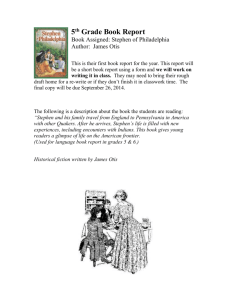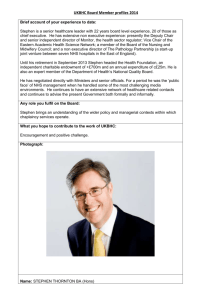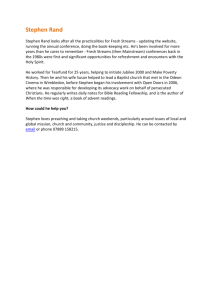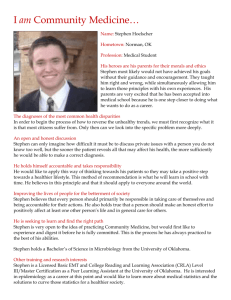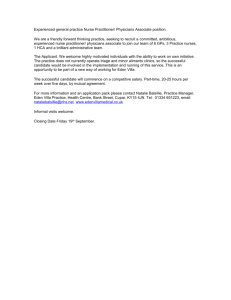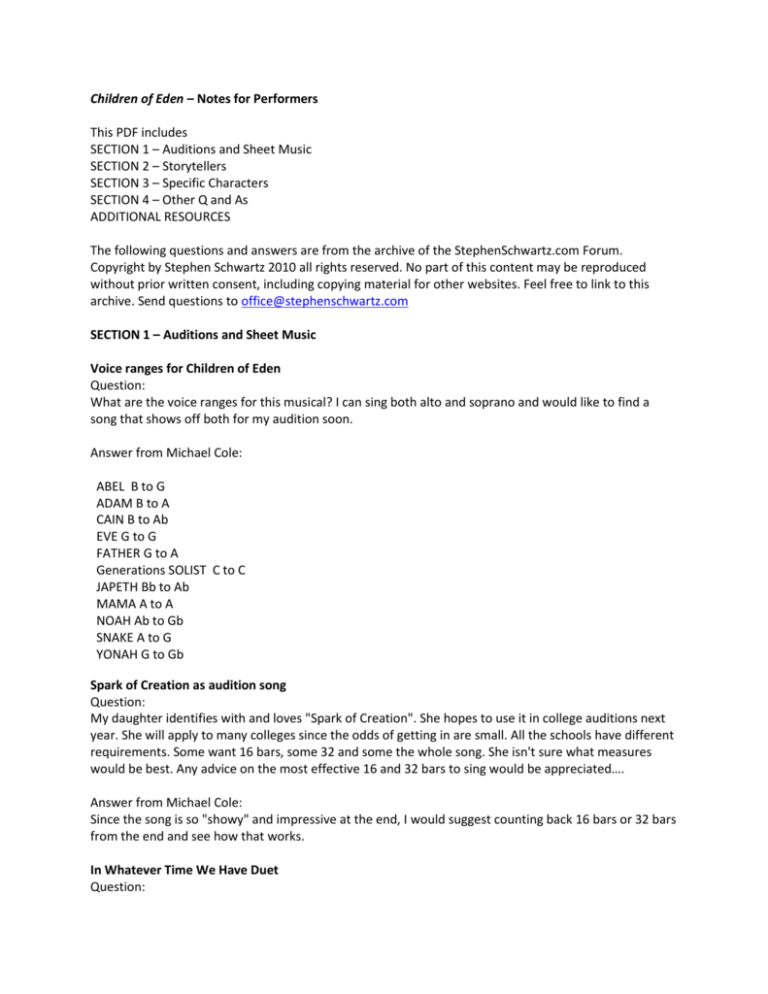
Children of Eden – Notes for Performers
This PDF includes
SECTION 1 – Auditions and Sheet Music
SECTION 2 – Storytellers
SECTION 3 – Specific Characters
SECTION 4 – Other Q and As
ADDITIONAL RESOURCES
The following questions and answers are from the archive of the StephenSchwartz.com Forum.
Copyright by Stephen Schwartz 2010 all rights reserved. No part of this content may be reproduced
without prior written consent, including copying material for other websites. Feel free to link to this
archive. Send questions to office@stephenschwartz.com
SECTION 1 – Auditions and Sheet Music
Voice ranges for Children of Eden
Question:
What are the voice ranges for this musical? I can sing both alto and soprano and would like to find a
song that shows off both for my audition soon.
Answer from Michael Cole:
ABEL B to G
ADAM B to A
CAIN B to Ab
EVE G to G
FATHER G to A
Generations SOLIST C to C
JAPETH Bb to Ab
MAMA A to A
NOAH Ab to Gb
SNAKE A to G
YONAH G to Gb
Spark of Creation as audition song
Question:
My daughter identifies with and loves "Spark of Creation". She hopes to use it in college auditions next
year. She will apply to many colleges since the odds of getting in are small. All the schools have different
requirements. Some want 16 bars, some 32 and some the whole song. She isn't sure what measures
would be best. Any advice on the most effective 16 and 32 bars to sing would be appreciated….
Answer from Michael Cole:
Since the song is so "showy" and impressive at the end, I would suggest counting back 16 bars or 32 bars
from the end and see how that works.
In Whatever Time We Have Duet
Question:
Hi everyone! I am desperately searching for the duet version of In Whatever Time We Have, but have
been told that it was turned into a solo in the vocal selections book. My boyfriend and I have to sing it
at his sister's wedding in just over a week, so we REALLY NEED IT! If I am mistaken about the vocal
selections being a solo, please let me know.
Answer from Michael Cole:
Email me: office@stephenschwartz.com
SECTION 2 - Storytellers
Telling the Story: Children of Eden Storytellers
Question:
From Peggy: Stephen (or anyone else who would care to comment), what kinds of sound effects do the
storytellers provide. The only thing ours did last year was to pound on the wooden boxes on which they
were sitting when Cain killed Abel. It seems to me I remember something in the archives about the cast
playing instruments, and as I listened to COE for the zillionth time, I started wondering if it would be fun
to give a bunch of instruments (like the kinds school children play) for the storytellers to use during
some of the livelier songs. And for the first time today, as I listened to "The Return", I began to wonder if
the animal noises that I hear on the CD could be made (some of them anyway) by storytellers with
instruments. Last year we just kind of sat there and waited while the animals passed by on their way to
the meadow; but there's got to be something more we can do to participate. So I'd love to hear
comments on how storytellers can use sound effects, and if they could be used in "The Return" as well
as elsewhere.
Answer from Stephen Schwartz:
You are right that the Storytellers are integral to the show. In addition to narrating much of the action,
and of course watching it and reacting to it, they are often used to help make the Tree of Knowledge,
the waterfall, the ring of stones, etc. Plus to provide sound effects. The point is that the story is being
told to the audience by this entire group, all of whom share a sense of urgency and need to convey its
lessons. Each production will make its own choices as to how specifically to use them. Thanks as always
for your interest. Sincerely, Stephen Schwartz
Storytellers
Question:
How much of the show are the storytellers involved in? Are there actually lines for these tellers, or
basically chorus?
Answer from performer Peggy Kern:
The storytellers in CHILDREN OF EDEN are involved in pretty much the whole show. They're basically a
chorus, but actually more than that, as they transform the set from garden to wilderness, and basically
tell the story in song. In the productions of COE that I've been in as a storyteller, we were onstage for
almost the entire show, responding to what was going on, either in song or actions. Hope this helps.
Children of Eden Storytellers all-knowing?
Question:
Dear Stephen, I have just graduated theatrical college in London where our final show was Children of
Eden and throughout my whole three years of training I have enjoyed performing in this particular show
more than any other which I feel sure is due to the enjoyment I get from singing your stunningly
beautiful score. I was cast as one of four storytellers in our version performed at St. Pauls in Covent
Garden and therefore would like to thank you for writing 'Wasteland'- fantastic song to sing! (Although I
wouldn't have minded singing 'Spark' or 'Stranger' either but hey- you cant have everything!)
Unfortunately, now we have to write up and actor's notebook in order to obtain our degree which I get,
it has to be said, slightly less enjoyment from. Anyway, I wondered if you could enlighten me as to
whether you and John Caird intented the Storytellers to be omniscient entities throughout the show or
whether they are discovering the events of the action as they tell them, along with the characters and
the audience? Many thanks, Ellie Chidgzey
Answer from Stephen Schwartz:
Dear Ellie: That's a good question. I've never actually discussed it with John, so I'll just give you my
interpretation. I think that the "event" of CHILDREN OF EDEN is a passing-along of the story from the
Story-tellers to the audience. Therefore, they are "ominiscient" in terms of knowing how this particular
story turns out. But they are in the same boat (pardon the pun) as the audience in terms of not knowing
what our collective future will be (as sung about in "In the Beginning" and the final "Children of Eden"
reprise.) Throughout the evening, of course, there are times when the Story-tellers act and react in the
present for, in fact, story-telling purposes, just as anyone telling a story would try to keep the drama
fresh and immediate. But I would say the concept is definitely that they are telling the story of
CHILDREN OF EDEN in the past tense. Thanks for raising an interesting question, Stephen Schwartz
Storyteller
Question:
hey guys! i just tried out for CoE and i think i may be cast as a storyteller. i was wondering if this was
just what the chorus was called or if they are a separate group that does special stuff or something lol.
id appreciate any answers bc ive never seen the show and i only have the highlights cd. Thanks!!~fal
Answer from performer Peggy Kern:
I've been a storyteller in COE three times, and for me, it's more than just being in a chorus. You're
actually helping to tell the story, not only by the songs, but by moving props, tearing down the garden
and constructing a wilderness scene, etc. In our production, we storytellers were onstage for almost the
whole show, except for maybe five or ten minutes. So even if we weren't actually singing a song, we
were expected to be reacting to what was happening with the characters in the show: delight at all the
animals Father had created and at Adam and Eve's names for them; anxiety as Eve interacted with the
snake; horror at the family fight at the ring of stones. And we became Eve's descendants, gathered
around her during her monologue and song at the end of the first act, grieving for the loss of our
"mother" and what had happened to us. In the second act, we were shocked when Japheth chose
Yonah to be his wife, and worried about what Noah would decide to do with her when she was
discovered on the ark. We agonized with him as he wrestled with his decision during "The Hardest Part
of Love", and we rejoiced when the flood was over and we could sing "Ain't It Good". Then we accepted
responsibility for our choices and our free will (which hopefully continued after we took off our
costumes and makeup) during the finale. If you can get beyond the normal "chorus" mindset while
doing the show (i.e. "okay, here's my song" "now that's done and I'm free until the next one"), and
really get into the story and what the message of free will and personal responsibility means to you
personally, you'll discover that being a storyteller in COE is really a lot more profound than "singing in
the chorus". I hope you enjoy the COE experience as much as I did, and find it a powerful experience,
both for yourself and for those who come to see it. Oh, and it's well worth the money to get the
complete COE CD.
SECTION 3 – SPECIFIC CHARACTERS
FATHER - On "Improving" Casting of Children of Eden
Question:
I've just been casted as Father in COE, and have absolutely fell in love with the show. I just wanted
everyone's opinion on a few things. Well, first, my director chose to split the parts of Eve/Mama Noah,
and Adam/Noah, and chose to make Cain/(ham or shem i always forget) and Abel/Japheth, casting
changes that I artistically don't agree with, but will have to live with. Now, are there any guidelines we
can now take so as to not destroy the corrolations between acts one and two- will parallel
blocking/music, and book corrolations bring out the similarities of the story as a whole? What did you do
if you were in this situation? Hmmm.... what have been your set ideas? What kind of materials did you
use for the animals - I would really love to have great animals in the show, we've tried things from the
panels of venetian blinds to oversized plus animals to paper mache, but what did YOU do? I'm just
wondering, and would love a reply. Thanks, Dan
Answer from Stephen Schwartz:
Dear Dan -- My only suggestion to you is to play the role of Father relating to Adam and Noah as if they
are played by the same actor, etc. I don't know what to tell you about the distressing decision to have
the actor who plays Cain play Ham or Shem rather than Japheth.
Perhaps your director is trying to "spread the wealth" around among the actors to attract a better
quality of cast or keep a repertory company happy or something, but I can't help but be irritated when
people change what I feel are elements vital to make a work function. Perhaps the title page for your
production should say: "By John Caird and Stephen Schwartz, as improved by your director." Okay,
there, I've expressed my annoyance. Now -- hope your production goes well and you have a good time
doing it. Sincerely, Stephen Schwartz
The Character of "Father"
Question:
Hi Stephen. I'm just in rehearsal (playing Father) in a UK production of "Children of Eden". We are
performing it in a Church in a few weeks time .I'm having a bit of trouble with interpretation and
wondered if you could throw some of your original thoughts at me? In particular I'm finding Father's
realisation in "The Hardest Part of Love" to be difficult to portray as it appears to be too sudden a
change from his withdrawn approach. Do you think its ok to have such an instant change of mood? Its
almost a mirror of the opening of the show - as if someone has turned on the light again! We both know
that acting and characterisation is primarily in the eyes and I wonder if a more thoughtful approach to
"The Hardest Part of Love" would be better and a continuing gradual realisation of his mistakes
throughout the remainder of the show, culminating with a full realisation in "In The Begining" would be
more subtle. Any thoughts you have would be warmly welcomed. Kindest regards, Andrew Taylor
Answer from Stephen Schwartz:
Dear Mr. Taylor: Thanks for your Email and your thoughtful question; I hope rehearsals for the
production are going well. Father's realization in "The Hardest Part of Love" is actually meant to be the
culmination of a progression that begins at his lowest point, after "The Flood" ("I have destroyed the
thing I love, and now I feel so old.") Thereafter, he is silent, but HE OBSERVES WHAT IS HAPPENING
BELOW. (The reason I have put this in capital letters is that it is very important; there is a stage direction
to that effect so that the director makes sure this is possible in the staging.) From his low point of
depression and its concurrent apathy, his attention is first piqued by Yonah, when she sends out the
dove. Thereafter, he sees how Japheth refuses to re-enact the murder of his brother, and thus breaks
the cycle of violence. He sees Noah struggling with his conscience. As he watches these events with
growing interest, his mind and heart are slowly changed, so that by the time he sings in the middle of
"Hardest Part of Love", it is the culmination of a process. I hope this will prove helpful to you, and I wish
you and the rest of your company all the best with the show. Sincerely, Stephen Schwartz
Stephen Schwartz on the role of "Father" in Children of Eden:
Question missing
Answer from Stephen Schwartz:
My best suggestion about the role is to take the character's name literally: that is, play him as a Father, a
human father, with all the emotional contradictions and conflicts, and forget that he happens to be God.
The times I've seen actors fail in this role, it is generally because they get hung up about playing God and
being infallible, etc. The whole point of the role (and the show) is that he learns about how to deal with
his children (and their progeny); along the way, he does a lot of "wrong" things -- tries to over-control
them, loses his temper beyond all reason, takes their maturing as a betrayal and as meaning that they
love him less, tries to bribe his grandchildren and induce them to keep guilty secrets, etc. Of course, all
of this comes out of love, which is why he is a character we care about. But the more he can feel like a
flesh-and-blood father (who just happens to be omnipotent), the better. Anyway, that's the most useful
suggestion I can think of.
Children of Eden: The Hardest Part of ... Father
Question:
I am involved with a production of Children of Eden, cast in the role of father. I was wondering if anyone
had advice on the portrayal of the role. I welcome any insight from anyone involved with any production
of COE in the past. Thanks.
Answer from Michael Cole: I asked my friend Jim Smith to send his insights on performing the role of
Father. His performance was stellar. I think he gives very good advice. Hope this is helpful. Best, Michael
Cole (see below)
Answer from Jim Smith:
I, too, had difficulty at first getting a handle on the character of Father. Then I read somewhere in the
notes of Stephen Schwartz where he warned of playing Father as "too likeable"; that it is a story of
relationships, not biblical stories. It made all the difference in the world. As a result, I treated Father as a
controlling earthly father with muscle and heart. It hurt to do all the hard things that he had to do, but
nonetheless, he did them. For example, at the top of the show leading to the Expulsion, the hurt that
Father feels is almost tangible. When he says to Eve in response to her eating the apple, " I told you not
to touch it" he is sorry for what is about to happen. A course of events is beginning that he knows he
can't change. He mustn't be omnipotent here, however. He needs to be surprised and cut to the heart
when Adam eats the apple. Then what follows is a parent's heartbreaking response to children making a
wrong choice: strong, harsh punishment inflicted by a parent who is intent on punishment, no matter if
all suffer, including the parent. I made Father that unyielding parent who finally, finally has his eyes
opened during '"The hardest part of love", which is easily the most meaningful and revealing lyric I have
ever had the pleasure to utter. Make Father a human father is my best advice. All of the mystical,
magical stuff takes care of itself. If you don't know about Process Theology, as I didn't before EDEN, you
might look it up on the Internet. I talked with a Sister of Mercy, whose niece played the dove in our
show, about Process. I asked her what it is and she said, "What you just portrayed as Father is the
essence of Process": God changes with us. What a burden lifted off my shoulders to think that
something like that is possible. I have said many times that John Caird and Stephen Schwartz were
inspired by God to write this masterpiece and give the world a new voice to answer some questions and
help us live in this day and age. For me, Father was a once in a lifetime role. It perfectly suited my voice
as a lyric baritone and gave me chance to use my operatic training. Its message has changed my life.
Good luck.
Eve in Children of Eden
Question:
I am about to audition for the part of Eve in an amateur production. We have been given Eve's last scene
(monologue) and then the song 'Children of Eden'. Although I know the show well, having played Mama
Noah before, I wanted to ask if you had any tips on the emotions in that section (ie how internal or
external she should show what she's feeling).
Answer from Stephen Schwartz:
More than anything, I think it's important to remember that Eve is a very old woman at this point in the
play. I recently saw a production in which the actress playing Eve didn't "age" at all for the end of the
first act, and I felt it totally didn't work. She has the wisdom of experience, and the knowledge that
comes from having lived a long and difficult life. Her emotions, therefore, are mostly contained, though
occasionally, and particularly when dealing with her long-silent Father, they burst out, as when she says
"I know you can hear me, I know it" and "I've missed you." In the song "Children of Eden" itself,
however, I think she is feeling a kind of serenity, now that Father has spoken to her again, and she is
lovingly but realistically transmitting her legacy to her progeny. I hope these thoughts prove helpful to
you. Sincerely, Stephen Schwartz
Yonah in Children of Eden
Question:
I just got cast as Yonah in the production Children of Eden. Rehearsals haven't started yet, but I was
wondering if anyone knew of where I could find a more detailed character analysis? All of the websites I
have browsed are extremely vague in their character descriptions! Thank you.
Answer from Carol:
Hi- It seems, in a way, like she gives her own character description in her solo "Stranger to the Rain." If
you really grasp that song and understand where she enters the story, and what role she plays, that's
what you need. She is sort of an archetypal outcast.
Answer from a Forum visitor:
She is the tragic hero of the story even though she is made up (although there were many women in the
Bible like her). She is willing to drown herself in the flood so that the family does what Father wants of
them. She also sings about praying that Father will send him another love so that he will not be alone.
She has true selfless love. Ultimately she helps bring the family together through her love for Japeth but
most importantly her faith and love for God. See, she is one of the cursed and yet she still believes,
loves, honors and hopes in God. There is a beautiful innocence about her with a gorgeous strength that
is seen throughout especially toward the end. Yonah can be played and liked or she can gain the
audience heart. She is my favorite and I love singing her songs especially her harmony with Japeth.
Although Mama's Ain't it Good is my favorite to bust out the gospel singing! Good luck and I hope this
helps and congrats!
Thoughts on Japeth
Dear Mr. Schwartz, I have read through the archives and other past posts and have noted that in order
for "CoE" to work well the double casting should be done as stated in the book. (i.e. adam/noah,
eve/mama noah) I was recently cast for my high school's performance as Seth and Japeth, instead of the
Cain/Japeth as stated in the book. In our production Abel is still Ham, but Cain is now Shem. Would this
take away from the show just as much as throwing entirely new actors into the roles of the "Noah
Family?" Also, since I wouldn't have the same connection with the audience or story because I wasn't
Cain, is there a different way I should approach this role? Thank you for taking the time to let-alone read
this, I'm really interested in the performing arts and willing to learn as much as possible, having the
opinions as someone as talented as you are would greatly help my future and possible career as an
actor. Once again, thank you very much, and have a great day. Cordially-Zach Brown
Answer from Stephen Schwartz:
Dear Zach: I don't want to throw your high school show into turmoil, and therefore am absolutely not
suggesting changing the casting. Obviously, in a school, part of the purpose of doing a show is to spread
the best roles around so that more students get a chance (and thus you get to play the more central role
in the second act). However, the truth is that ideally Cain and Japheth should be played by the same
actor, since in the first act, Cain commits the murder and in the second act Japheth starts the chain of
redemption by refusing to commit another murder. So yes, it will take away from the show. However,
as I say, there are other reasons for doing shows in school that need to be honored.
Your director will no doubt have thoughts on how you should approach this alternative double-casting.
My best suggestion would be for you and the student playing Cain to rehearse the murder scenes
together often enough that they can look and feel absolutely identical, right up till the moment when
Yonah screams "No!" Hope the show goes well for all of you. Thanks, Stephen Schwartz
SECTION 4 – Other Q and As
Children of Eden: Singing While Wearing Masks
Question:
Our local community theater group is presenting COE in March. Our director intends for us to sing AIN'T
IT GOOD wearing our animal masks. Is this vocally possible? Even with eye and mouth openings in the
masks, will enough sound project? Depending on the blocking, will we even be able to see the orchestra
conductor for cues? Our singers are mostly not 'musicians'. They are struggling to learn the harmonies
and rhythms in this number. The director's argument is: the animals are celebrating the end of the rain
also. I buy that argument, but wonder if the audience will. It is a GREAT number-so lively, so fun to sing.
Shouldn't the audience see the joy on our faces-not a painted on, non-changing expression on a mask?
Opinion?
Answer from Stephen Schwartz:
I have seen "Ain't It Good" done with the animals transforming back into Storytellers or remaining
animals throughout. It works both ways, though I have to admit I have a little problem with animals
singing, since they don't sing anywhere else in the show. But I have seen it work. I think a lot has to do
with how literal the animal costumes are. I do think if you're having trouble singing or seeing the
conductor, an adjustment in either the costume or the concept should be made, but why don't you
practice it the way the director wants a few times and see if it gets easier. I have found often that things
which seem impossible for actors to do at first become second-nature with practice. Thanks for the
interesting question. Sincerely, Stephen Schwartz
ADDITIONAL RESOURCES
Background information, cast album, sheet music, photos from various productions
http://www.musicalschwartz.com/children-of-eden.htm
Licensing
http://www.mtishows.com/show_detail.asp?showid=000175
Complete history with photos from the London production and Paper Mill Playhouse can be found in
“Defying Gravity: The Creative Career of Stephen Schwartz, from Godspell to Wicked.”
www.DefyingGravityTheBook.com. The book explores the genesis of Children of Eden, from Charles
Lisanby's conception and the early oratorio version by Schwartz, through the London production
(including photographs), and revisions worked out in America. The Children of Eden chapter includes
quotations drawn from interviews with Lisanby, Schwartz, bookwriter John Caird, and others that
explore the philosophy behind the musical.
Notes from other productions, etc. – Children of Eden section of MTI show space
http://www.mtishowspace.com/mod/shows/mtishow.php?showid=000175



